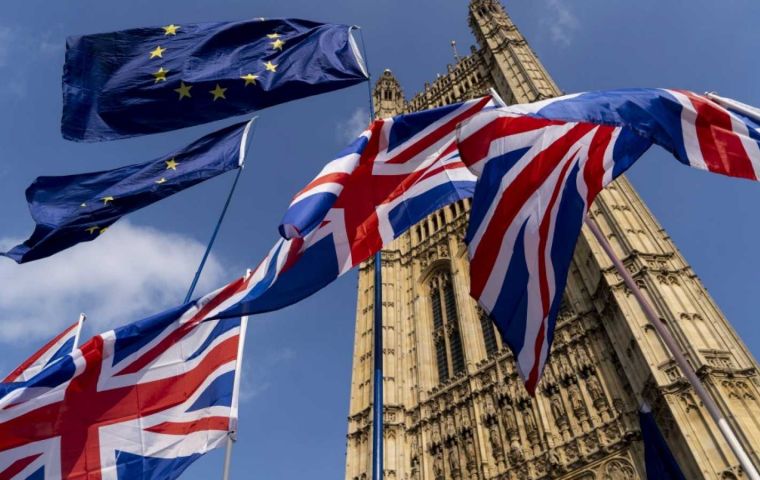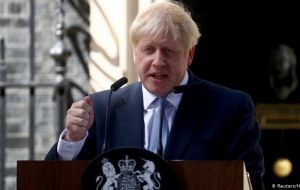MercoPress. South Atlantic News Agency
Bitterly divided Britain abandons European Union; Johnson message calling for unity expected
 Britons remain as divided as they were nearly four years ago, when 52% voted to leave but 48 per cent voted to remain in the EU
Britons remain as divided as they were nearly four years ago, when 52% voted to leave but 48 per cent voted to remain in the EU  Boris Johnson himself is a polarizing figure but he has emphasized unity and is avoiding any major celebrations that might exacerbate divisions.
Boris Johnson himself is a polarizing figure but he has emphasized unity and is avoiding any major celebrations that might exacerbate divisions.  At 10pm, he will broadcast an address to the nation, and then host a reception for staff at his 10 Downing Street office.
At 10pm, he will broadcast an address to the nation, and then host a reception for staff at his 10 Downing Street office. Britain this Friday, 31 January ends almost half a century of integration with its closest neighbours and leaves the European Union, starting a new - but still uncertain - chapter in its long history.
At the clocks strike 11pm - midnight in Brussels - Britain becomes the first country to leave the 28-member bloc and goes it alone for the first time since 1973.
Prime Minister Boris Johnson has backed Brexit since the 2016 referendum vote to leave that triggered bitterness and division but he has promised to lead the country to a bright new future.
Official celebrations will be muted out of respect for half the population who wanted to stay in the EU and who remain fearful of what lies ahead.
“Our job as the government, my job, is to bring this country together and take us forward,” Johnson said in a statement to mark the historic occasion.
He added: “This is not an end but a beginning. This is the moment when the dawn breaks and the curtain goes up on a new act.”
Nothing will immediately feel different thanks to a transition period negotiated as part of an EU-UK exit deal, which was ratified only this week.
Britons will be able to work in and trade freely with EU nations until Dec 31, and vice versa, although the UK will no longer be represented in the bloc's institutions.
But legally, Britain is out - with no easy way back. And while the exit terms have been agreed, Britain must still strike a deal on future relations with the EU, its largest trading partner.
Despite Britain's resistance to many EU projects over the years - it refused to join the single currency or the Schengen free travel area - the 2016 vote to leave was a huge shock.
It unleashed political chaos in London, sparking years of bitter arguments that paralyzed parliament and forced the resignations of two prime ministers.
Johnson brought an end to the turmoil with his decisive election victory last month, which gave him the parliamentary majority to ratify the Brexit deal.
But Britons remain as divided as they were nearly four years ago, when 52% voted to leave but 48 per cent voted to remain in the EU.
Johnson himself is a polarizing figure but he has emphasized unity and is avoiding any major celebrations that might exacerbate divisions.
He will first host a special cabinet meeting in the northeastern English city of Sunderland, which was the first to declare for Brexit in the 2016 vote.
At 10pm, he will broadcast an address to the nation, and then host a reception for staff at his 10 Downing Street office.
A light show will also be held outside No 10, while millions of commemorative 50 pence coins are being minted to mark the occasion.
On them is the message: “Peace, prosperity and friendship with all nations.”




Top Comments
Disclaimer & comment rulesCommenting for this story is now closed.
If you have a Facebook account, become a fan and comment on our Facebook Page!